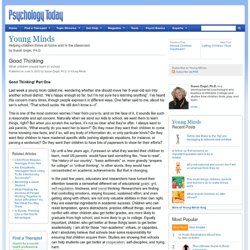

Good Thinking. Last week a young mom called me, wondering whether she should move her 8-year-old son into another school district.

“He’s happy enough so far, but I’m not sure he’s learning anything”. I’ve heard this concern many times, though people express it in different ways. One father said to me, about his son’s school, “That school sucks. He still don’t know s—t”. This is one of the most common worries I hear from parents , and on the face of it, it sounds like such a reasonable and apt concern. Up until a few years ago, if pressed on what they wanted their children to learn, most US parents would have said something like, “how to read”, “the history of our country”, “basic arithmetic” or, more grandly “prepare for college” or “critical thinking”.
In the past few years, educators and researchers have turned their attention towards a somewhat different set of educational goals : grit , self-regulation , kindness, and moral thinking. Are You a Poor Communicator? Stop the Damage and Improve Relationships. The four characteristics of ineffective communication “Trouble comes from the mouth.” – Chinese Proverb 1.

“You” language plus directives Ineffective communication is often characterized by the use of certain types of “you” language, such as “you are...,” “you should...,” “you need to...,” “you have to...,” “you’d better...,” and “you people...”. “You are not good enough...” “You should pay attention...” “You need to do this now...” “You have to understand my position...”
“You better get it right...” “You people should behave...” Most people don’t like being judged or told what to do, and when we use “you” language plus directives, it’s easy to arouse in others feelings of resentment and defensiveness. "You" language plus directive is the verbal equivalent of finger pointing. It's important to note that there are "you" statements that are good for communication. 2. Universal statements are expressions that generalize a person’s character or behavior in a negative way. Psychologie positive (Wikipedia) Un article de Wikipédia, l'encyclopédie libre.

La psychologie positive est l’étude scientifique des forces, du fonctionnement optimal et des déterminants du bien-être. Ce champ de la psychologie vise à mieux cerner ce qui fait que la vie vaut la peine d’être vécue. If money doesn't make you happy, then you probably aren't spending it right